Pound of Flesh – Horror in Shakespeare and Mutilation in The Merchant of Venice
Horror Moments, Shakespeare Edition
‘Horror Moments’ is a series examining horror-inflected scenes and themes in unexpected places. The ‘moments’ are published weekly on Thursday mornings, and I share bonus content on the history of magic, theatre, storytelling, and more on Monday afternoons – don’t forget to subscribe!
[Spoilers: The Merchant of Venice (1596), Theatre of Blood (1973), Saw VI (2009)].
I couldn’t be more excited to be beginning a new series of ‘horror moments’ looking this time at horror in the the works of William Shakespeare.
As someone with a PhD in early modern literature and a love of horror films, this series will provide the perfect Venn diagram of my interests — but don’t worry, I will be talking about a range of other films and sources as we explore the bloody side of The Bard.
I will be keeping close to hand one of my all-time favourite films, Theatre of Blood (1973). It’s a brilliant romp where Vincent Price enjoys himself immensely playing Edward Lionheart, an actor who kills off a series of unappreciative critics in the manner of different Shakespearean deaths.
In fact, to get things started, I’m going to cheat slightly and explore a scene that is arguably not quite a horror moment in the original play, but absolutely becomes one in Theatre of Blood. This is the infamous ‘pound of flesh’ scene from The Merchant of Venice (1596).
There are, broadly speaking, two main ways to ‘go’ with Merchant as a story. The choice essentially hinges on how antisemitic you want to be since the plot follows the fallout of an unwise bargain struck between a Christian merchant, Antonio, and a Jewish moneylender, Shylock.
On the one hand, Merchant is a comedy in which good Christians triumph over a scheming Jewish man who viciously demands flesh in payment for the debt he is owed, but is outwitted and forced to give up his fortune and his faith in exchange for his life.
On the other hand, it’s a problem play where the happy ending feels more like a tragedy: Shylock is the victim of unbearable prejudice who lashes back at his oppressors and receives a humiliating punishment that makes the Christians look every bit as petty and vindictive as he.
To recap, the merchant has foolishly (and for the sake of a charismatic young man called Bassanio), signed a contract with Shylock which promises him a pound of his flesh if he can’t pay back the money. You can guess what happens: Antonio fails to pay so we end up in a courtroom with the moneylender insisting that the law recognise his right.
Horrifyingly, it looks like the contract is legally binding and Antonio braces himself for the act of mutilation. Some versions emphasise the nastiness of this by actually having him restrained and his chest bared, just moments away from feeling Shylock’s blade.
Thanks to clever bit of pedantry regarding the precise wording of the bond Portia, the disguised heroine of the play, is able to halt the procedure and rescue Antonio. Essentially she points out that there is no mention of blood in the agreement so technically if Shylock sheds any whilst retrieving the flesh he is in breach of contract. This is impossible, so the merchant is released—
Except that’s not what happens in the equivalent scene in Theatre of Blood. Here, Edward Lionheart (very much playing the ‘traditional’ version of Shylock) tricks one of the critics into taking on the role of Antonio in a rehearsal.
“You’ll find we’ve made several slight alterations in the text, and one rather large cut” says his accomplice. We now get the ending Shakespeare denies us: a man’s heart is cut out of his chest and weighed on a set of scales. Most of the deaths in Theatre of Blood are based on actual murders in the plays, but this one satisfies a morbid curiosity for something we don’t see in the original. In fact, it’s this adjustment that gives away the real identity of the murderer:
“Oh it’s Lionheart alright, only he would have the temerity to rewrite Shakespeare.”
But in 2009 another serial killer supposedly motivated by righteous vengeance would emerge and show this same temerity.
In the sixth instalment of the Saw franchise, we encounter a trap that the ‘Jigsaw’ killer has based on The Merchant of Venice and which he is using to teach two predatory money lenders a lesson. As always, there is a way to survive the ’game’, but it involves excruciating pain and self-dismemberment.
The ‘Pound of Flesh’ trap gives its victims 60 seconds to race each other in cutting off chunks of their own bodies and throwing them onto a set of scales. Whoever has deposited less when the time is up is killed by a device fitted to their head.
I wonder whether the filmmakers thought very deeply about why they rigged this trap for two evil moneylenders as opposed to reckless businessmen or arrogant antisemites, a scene which would have been closer to the original text where it is Antonio whose flesh is forfeit. Theatre of Blood might get out the old stereotypical Jewish costume, but it is Saw VI which subconsciously turns the trap on Shylock.
I’ll leave it to someone else to dig further into the nuances of Saw VI. Certainly Shakespeare’s original gives us a ‘horror moment’ ripe for gorier reimaginings. From here on, though, we deal with actual moments of death and violence in the plays and the gentle reader is warned that Shakespeare himself does get pretty gory, sometimes not much less so than a Saw film.
He might be the Swan of Avon, but if you’ve ever tried to have a picnic on the lawn outside the Royal Shakespeare Theatre you’ll know that swans are capable of terrifying brutality and violence.
Until next time, happy nightmares everyone!
Special thanks this week go to my newest paid subscriber Mai Nardone who is the author of ‘Welcome Me to the Kingdom,’ an extraordinary collection of interweaving stories set in late twentieth century Bangkok which was a New York Times Editors' Choice and long-listed for the PEN/Robert W. Bingham Prize. You can find it on Amazon.
Horror moments are posted every Thursday and a wide variety of articles exploring the history of magic, theatre, storytelling, and more are published on Monday afternoons.



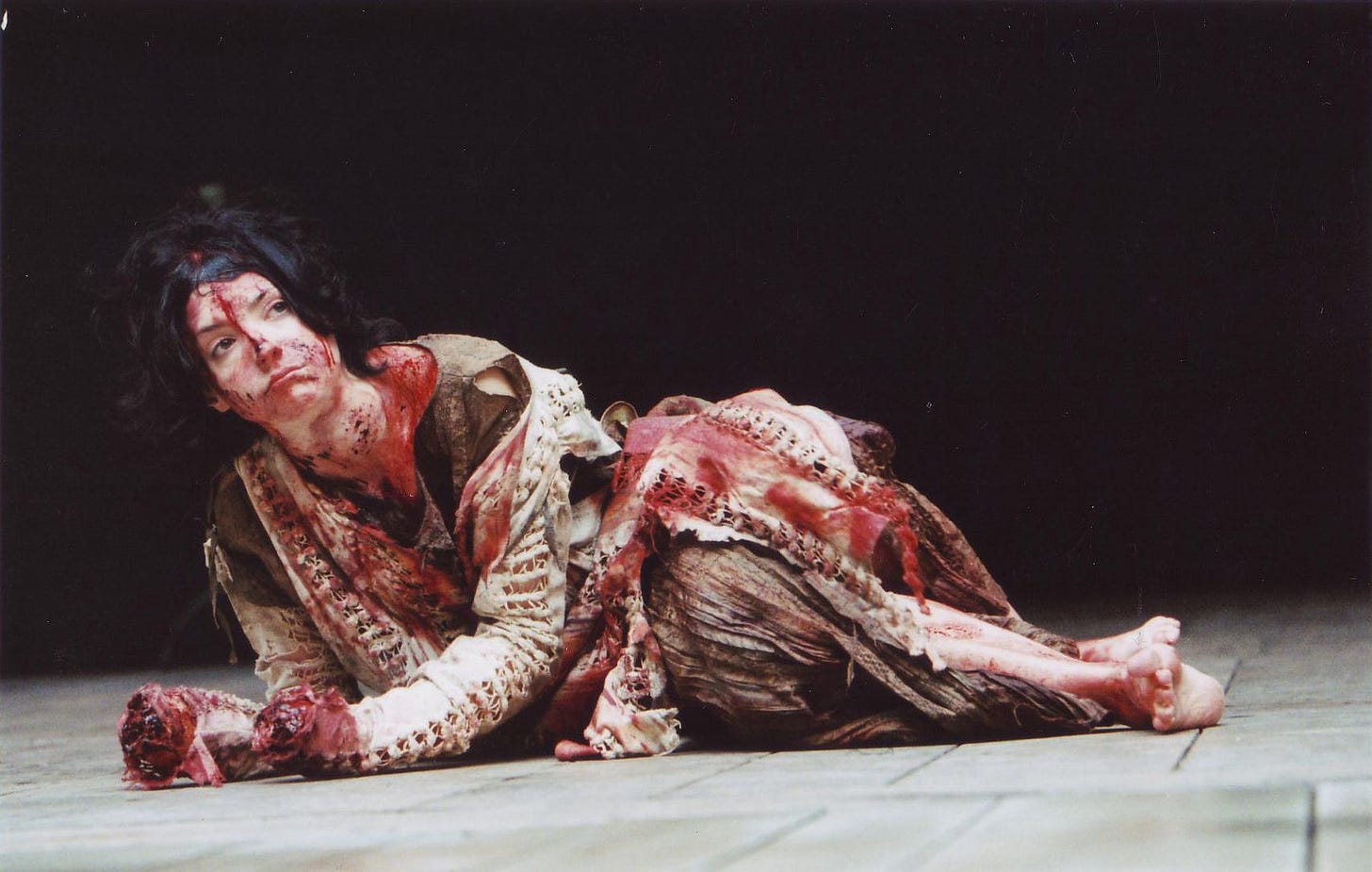
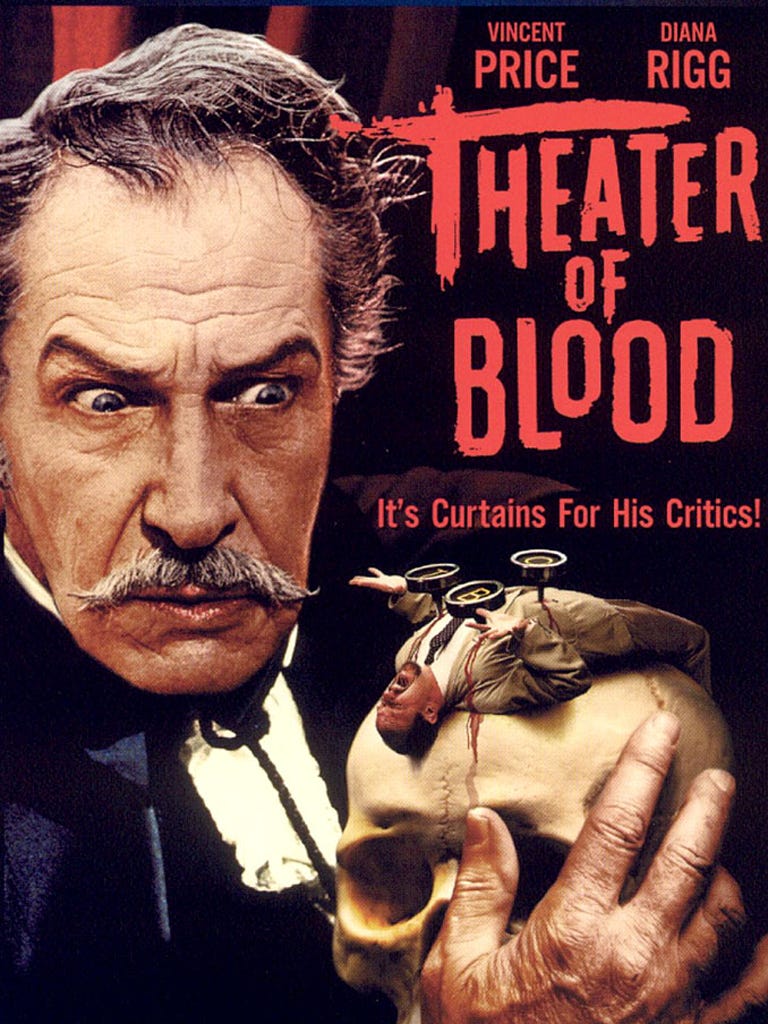
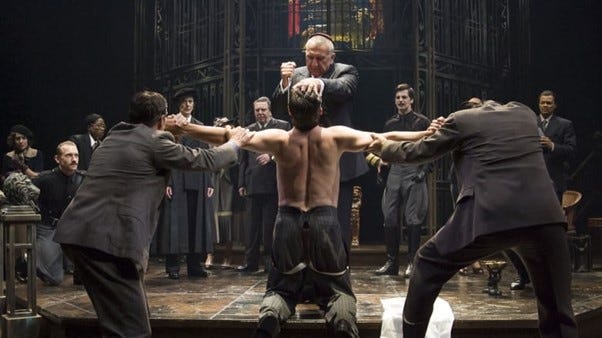
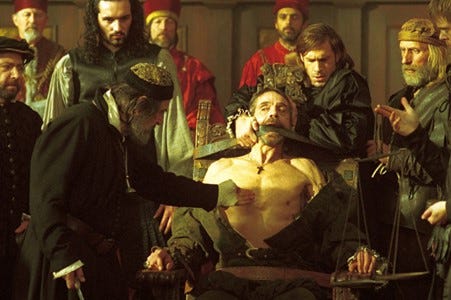
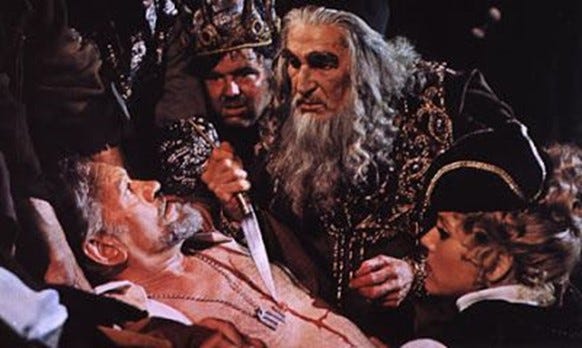
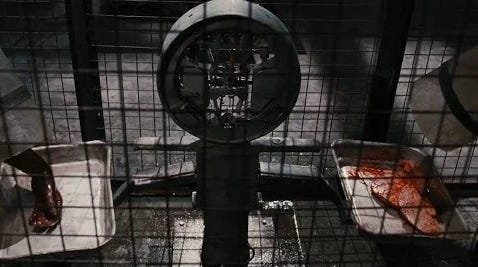
Shamefully, I have never seen Theatre of Blood. Equally shamefully, I have seen Saw VI.
I remember watching Theatre of Blood when I was around ten and staying with my grandparents. It came on TV, and they were both asleep. It was terrifying at that age! I think I would find it a lot more fun now I'm jaded and steeped in horror film knowledge.